#types of malaria
Explore tagged Tumblr posts
Text
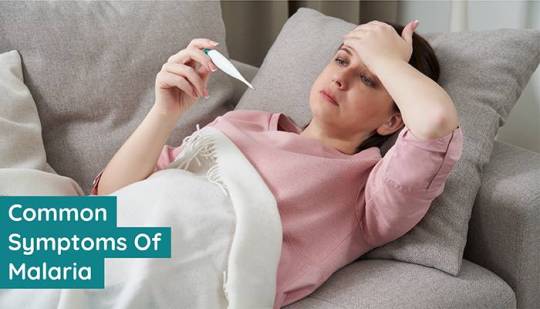
11 Most Common Signs And Symptoms Of Malaria Fever at Livlong
Check out the most common signs and symptoms of malaria you should know. Read this blog for more info on the malaria symptoms and treatment at Livlong now!
#malaria symptoms#malaria symptoms and treatment#signs and symptoms of malaria#symptoms of malaria fever#signs of malaria#types of malaria and their symptoms
0 notes
Text
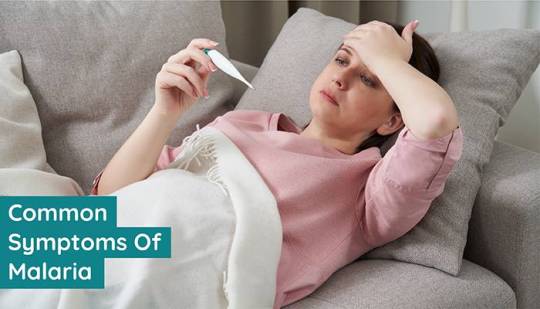
11 Most Common Signs And Symptoms Of Malaria Fever at Livlong
Check out the most common signs and symptoms of malaria you should know. Read this blog for more info on the malaria symptoms and treatment at Livlong now!
#malaria symptoms#malaria symptoms and treatment#signs and symptoms of malaria#symptoms of malaria fever#signs of malaria#types of malaria and their symptoms
0 notes
Text

this my buddy, {FOREIGN OBJECT}
(not my picrew)
0 notes
Note
What’s the worst injury they’ve each had?
I actually haven't thought about it that extensively. Neither of them is the type to get severely injured on the regular. Vasco has luck on his side and he's fit, healthy and solidly made, so he can take a few knocks before he starts to really feel it. Machete is an overly cautious indoor person, he rarely gets into risky situations.
I've been thinking of how likely it would be that Vasco had to take part in any serious battles or wars in his lifetime, and whether he'd come back from them unscathed. As a nobleman military duties are technically his responsibility. I could afford to break him just a tiniest bit, give him a taste of mortality. Either that or some kind of horse related accident.
Machete has more issues with various illnesses than wounds. A bad case of malaria very nearly killed him, before Vasco's intervention he was heading to hypovolemic shock from aggressive bloodletting, purging and dehydration.
#if we count fic events which aren't necessarily 100% canon Machete got knifed through midriff once#that's probably the worst physical injury#answered#anonymous#Vaschete lore
209 notes
·
View notes
Text
There's a book Parasite Rex (by Carl Zimmer) that is very illustrative of a variety of parasites, including iirc one that infects fish and birds cyclically, in a way that weirdly sorta helps the birds but like they're still being parasitized. ...did a google, if it's Eahaplorchis californiensis it goes through THREE animals in its complicated life cycle--add snails!
(As my parasitology professor said, all snails are heavily parasitized. But then he also said all cats have Toxoplasmasis sans evidence so maybe studying & teaching about parasites simply makes a person a little paranoid. I certainly itched a lot more than usual in that class.)
Fun fact: there are people very worried about the loss of trematodes:
I need to find out more about parasites other than cordyceps fungi because one of the stories I have had in the notes stage for while is very well positioned for me to turn it into parasite-perspectice narrative. It would make for the third major overhaul of a character but this time it feels right, this will be the version that ties it all together. So far the main takeaway I have is that rot and decay (or sometimes excrement) is often an essential element in the life cycle of terrestrial parasites so it kind of comes with its own built in extreme nastiness.
#this was 9 years ago#so i don't remember a ton#but the shit i do remember is great#ok so malaria--the different types and the cyclical fevers of different periods and their ability to evade detection is really cool#(and a huge problem for all the people malaria kills...)#stay away from walleye in the Great Lakes--they carry nasty parasites#basically fresh water fish in general are much more likely to have parasites that can cause problems for humans#whereas salt water fish are equally parasitized but those parasites don't bother us#NO WALLEYE SUSHI. DO NOT DO IT#beef & pork parasites that create uncomfortable/deadly cysts in humans who eat them (largely eradicated in modern ag thankfully) but yeah#the pig version? brain cysts. and iirc humans aren't even the intended target--the cycle is supposed to go from pig->predator->back to pig#but if the predator is a human the encysted parasites don't make it back to pigs...#mm yeah cysticercosis. caused by. a tapeworm. Taenia solium.#hang on. reading the wiki. yeah no my memory is am unreliable narrator. T. solium use human->pig->humam. and neurocysticercosis is not#guaranteed but is still a big deal. and it's largely gone from ag *in developed countries* and is still a problem in Latin America Africa &#Asia. anyway it's one of the reasons we still mostly insist (ha) on throughly cooking pork but we'll eat beef rare
34 notes
·
View notes
Note
Hey babe, wanna hear something hot? *whispers* history of metformin
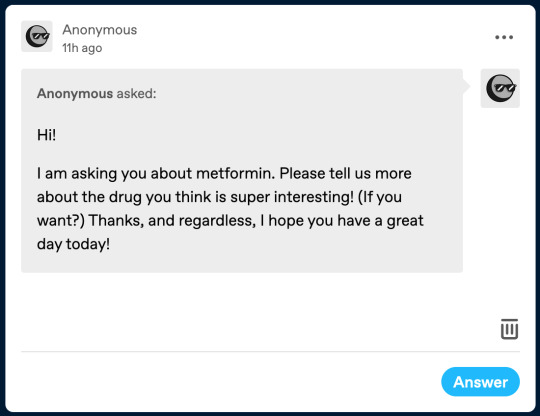
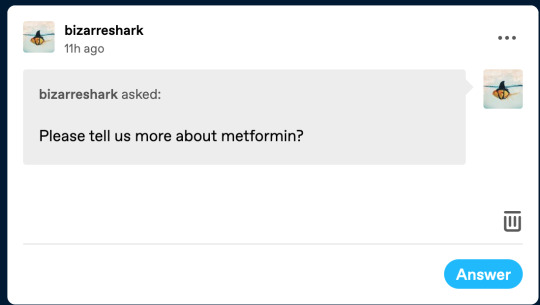
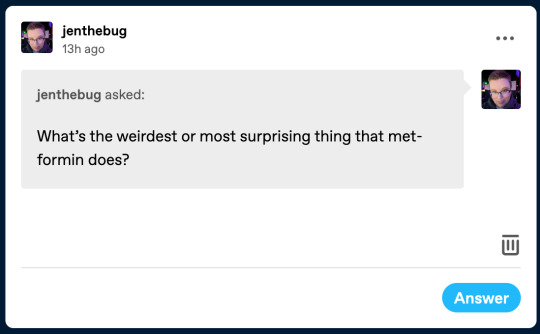

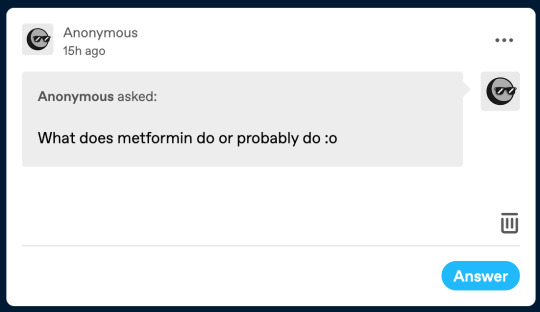
Ok okay I'll talk
So metformin is commonly thought of as the most boring of diabetes drugs. Like, everyone who has ever thought about maybe having type 2 diabetes is taking it unless it gives them diarrhea, and even then their doctor still probably wants them to take it. But it's a first line because it's old, it's cheap, it doesn't often cause hypoglycemia, and it has relatively few side effects compared to other diabetes drugs. Also, like a lot of older drugs, it does way more than it says on the packaging. And a lot of stuff we're still learning about.
In order to talk about metformin, we have to talk about a plant called goat's rue. Goat's rue is a plant native to Europe, Africa, and Asia, and currently grows just about everywhere. In ancient times it was used as an anti-parasitic, a plague remedy, and to relieve the excessive urination caused by what might have been diabetes. In 1918 it was found to contain a chemical called galegine, which did lower blood sugar. Galegine as an anti-diabetes medication is probably too toxic to use long term. However, with a few chemical tweaks, it could become a drug that lowered blood sugar without the toxic effects. Metformin was born.
Metformin came out in 1923 and is a type of drug called a biguanide. it's actually the only type in it's class still available as an anti-diabetic agent, because the other drugs in it's class that came out in the 1920s and 30s caused lactic acidosis and liver problems (similar to the types of reactions seen with galegine), and were taken off the market.
Metformin (and pretty much all oral antidiabetic agents in development at this time) didn't do well initially, probably because they came out the same decade as insulin, and insulin was a lot more effective at treating any kind of diabetes.
It fell out of use extremely quickly, and didn't get picked up again until the 1940s, when US access to antimalarial drugs was cut off, just as a war in the pacific was ramping up. Metformin was evaluated as an antimalarial during WWII, and while noted to have some anti-malarial properties (particularly as a malaria preventative) it also was noted to significantly lower blood sugar in diabetic patients- while not lowering blood sugar very much at all in non-diabetic patients.
This effect, rather than it's antimalarial properties, was what got scientists really interested. Unfortunately, it would not be until 1957 in France that metformin had its first major studies to determine that it did, indeed, work against diabetes. Metformin lost the race to the "first" (successful) oral antidiabetic agent by a year, to a different drug that was found while looking for a new antibiotic- Diabenese.
Metformin became a commercial success in France, while Diabenese became successful in the United States. Metformin would actually not be approved for use in the US until 1995.
But now we get to talk about what metformin does and why it's so freaking cool.
Type 2 Diabetes- lowers A1C (a measure of blood sugar control) by 1-2 full points
Prevents/reverses weight gain due to antipsychotics
Prevents and treats malaria
Makes the flu shot work better
Decreases severity of respiratory illness and complications related to the flu
Changes gut microbiome for the better
Regulates periods and reduces other symptoms in people with PCOS
Lowers risk of breast, colon, and prostate cancer
Lowers risk of dementia
Lowers risk of stroke
May increase lifespan
125 notes
·
View notes
Text
The mysterious lake fever
When the Battle of Lake Erie was fought on 10 September,1813, of Perry's 532 men, 116 were ill with an unknown fever. They all showed symptoms of malaria or yellow fever or even just severe influenza, but on a freshwater lake in America?

Perry at the Battle of Lake Erie, by James Edward Kelly, 19th century (x)
And then it wasn't just the 116, after the battle there were even more and only a few of the sick survived the whole thing. But what it was, the surgeons could not explain with the best will in the world, because they all showed different symptoms that could fit to one of the above mentioned diseases. But one thing they did know was that the men had all drunk from the water of the lake, which was generally considered drinkable.
Even though a lot of sewage was discharged into it, the men filled up their barrels upstream from a ship, because the water was good and clear. However, it was deadly. What exactly the fever was has not been fully elucidated to this day, even though the water led to a great cholera epedemy in the 1830s. It was considered drinkable until the 1970s, but had already been filtered since the 1850s, and the sick people who still came were simply accepted.
It is assumed that mosquitoes and other pathogens are in fact not only responsible for one type of disease, but also for malaria, typhoid, yellow fever and cholera.
38 notes
·
View notes
Text
ARE YOU SERIOUS? COVID-19 HASN’T GONE AWAY?
John Snow Project - 3 August 2024
Talk to most people about COVID-19 risks and a common response is, “If it was that bad, governments would do something about it.”
We’ve written previously about the analogies to smoking and the historic role governments played in normalizing harm even after the risks were well proven1.
While COVID-19 has been causing disruption at the Olympics2-4 and regions around the world report sustained high rates of transmission5-7, just this week three studies have been published demonstrating COVID-19’s role in increasing the risk of deafness8 and harming the vascular system following acute infection9, and causing immune dysregulation and cardiovascular damage in people with Long Covid10. These join the many thousands of studies evidencing the short and long-term harm of SARS-CoV-2 infection.
Some people will decry the sheer volume of such studies saying it is improbable a single pathogen can cause such diverse damage. SARS-CoV-2 doesn’t care about probability or people’s expectations. It is a virus that infects cells using one of the most common receptors, a receptor that is expressed almost everywhere in our bodies. It can infect many types of immune cells and has been demonstrated to persist for years in the gut and spinal fluid of some people11. SARS-CoV-2 has also been shown to cause chronic activation of the immune system and play a role in driving new onset allergies, allergic diseases and autoimmunity12,13.
People in the Covid cautious community often wonder when governments will finally take this pervasive virus seriously. For the uninformed, COVID-19 is akin to a cold, and some particularly ill-informed people believe the virus has gone away entirely. There are still some people who are shocked to experience reinfection.
With Long Covid remaining a significant risk14,15, and promises of protective immunity, hybrid immunity and super hybrid immunity receding into the rearview mirror of ignorant and unfounded optimism, it seems people must simply accept the roulette of repeat infection. But should they? For some COVID-19 will pass with symptoms similar to a cold, for others it will be fatal. For a significant proportion it will be debilitating. And we still haven’t seen the long-tail risk. It is entirely reasonable to expect that like Epstein Barr Virus, Cytomegalovirus and HPV, SARS-CoV-2 will cause damage years or decades after infection16.
There is another way. Instead of blithe nihilism and the abandonment of principles of public health that have advanced human society for centuries, governments could instruct their public health and regulatory agencies to insist on cleaner air policies, mandating air quality that protects human health, in the same way we mandate water quality. Malaria prevention is not perfect, but that doesn’t stop us using every possible tool at our disposal to minimize the impact of the disease around the world.
Many engineers have decried the idea of needing a random trial to prove physics, but a Norwegian team did one anyway, examining whether surgical masks help prevent infection by respiratory viruses.They found surgical masks were 30% effective at reducing symptoms of respiratory infection17. This is no surprise. It’s long been established that surgical masks have a minor impact on airborne infection control, but they aren’t worn by anyone who is serious about avoiding SARS-CoV-2 or any other respiratory pathogen. A 2008 UK Health and Safety Executive evaluation demonstrated that surgical masks provide a 6-fold reduction against aerosolized virus, while respirator masks provide at least a 100-fold reduction18.
Perhaps one of the biggest calamities of the COVID-19 pandemic was robbing people of one of the most effective forms of protection: respirator masks. Many people believe masks don’t work, or if they do that they primarily protect others from infection and don’t protect the wearer. This belief is completely unfounded and wholly wrong. Respirators have long been used to protect people working with some of the most dangerous pathogens imaginable, and FFP3/N99 respirators have been shown to offer up to 100% protection against SARS-CoV-2 in healthcare settings19. Imagine how many lives might have been saved and how many cases of Long Covid could have been avoided globally if people had been told that a well fitted mask of the correct grade (N95/FFP2 or higher) can offer complete protection against infection. We don’t need a magic bullet to solve the problem of COVID-19. We need to end the denialism that afflicts us and confront reality. We need to stop living in a comforting delusion and use the tools we already know work to minimize the impact of the disease. Masks, ventilation, filtration, vaccination, isolation, and therapeutics. As this study of hospital admission protocols clearly demonstrates20, we have the tools we need to protect human health. We need to start using them.
Reading Time 4 minutes Author John Snow Project References Merchants of Doubt johnsnowproject.org/insights/merchants-of-doubt/
German decathlete Eitel to miss Paris in latest Covid-19 case sports.yahoo.com/german-decathlete-eitel-miss-paris-163813910.html
Covid cluster worsens in Australian Olympic camp as Zac Stubblety-Cook reveals infection www.theguardian.com/sport/article/2024/aug/01/covid-cluster-worsens-in-australian-olympic-camp-as-zac-stubblety-cook-reveals-infection
Is there a COVID outbreak at the Olympics? At least 9 athletes test positive in one week www.today.com/health/coronavirus/covid-olympics-2024-rcna164070
COVID Map Shows Surge in States With 'Very High' Levels in Wastewater www.newsweek.com/covid-19-map-wastewater-levels-1932576
COVID surging in California, nears two-year summer high. ‘Almost everybody has it’ www.latimes.com/california/story/2024-07-29/covid-surging-in-california-as-virus-levels-in-sewage-near-two-year-summer-high
Wastewater COVID-19, Biomathematics and Statistics Scotland www.bioss.ac.uk/collaborate-us/wastewater-covid-19
Incidence of hearing loss following COVID-19 among young adults in South Korea: a nationwide cohort study www.thelancet.com/journals/eclinm/article/PIIS2589-5370(24)00338-9/fulltext
Long-term effects of COVID-19 on endothelial function, arterial stiffness, and blood pressure in college students: a pre-post-controlled study bmcinfectdis.biomedcentral.com/articles/10.1186/s12879-024-09646-w
COVID-19 related myocardial injury is associated with immune dysregulation in symptomatic patients with cardiac MRI abnormalities academic.oup.com/cardiovascres/advance-article/doi/10.1093/cvr/cvae159/7723296?searchresult=1
Long COVID and SARS-CoV-2 persistence: new answers, more questions www.thelancet.com/journals/laninf/article/PIIS1473-3099(24)00216-0/fulltext
Incident allergic diseases in post-COVID-19 condition: multinational cohort studies from South Korea, Japan and the UK www.nature.com/articles/s41467-024-47176-w
High risk of autoimmune diseases after COVID-19 www.nature.com/articles/s41584-023-00964-y
Long Covid risk has dropped over time but remains substantial, study shows edition.cnn.com/2024/07/17/health/long-covid-risk/index.html
Postacute Sequelae of SARS-CoV-2 Infection in the Pre-Delta, Delta, and Omicron Eras www.nejm.org/doi/full/10.1056/NEJMoa2403211
Is SARS-CoV-2 an oncogenic virus? www.ncbi.nlm.nih.gov/pmc/articles/PMC9361571/
Personal protective effect of wearing surgical face masks in public spaces on self-reported respiratory symptoms in adults: pragmatic randomised superiority trial www.bmj.com/content/386/bmj-2023-078918
RR619 Evaluating the protection afforded by surgical masks against influenza bioaerosols www.hse.gov.uk/research/rrhtm/rr619.htm
Efficacy of FFP3 respirators for prevention of SARS-CoV-2 infection in healthcare workers www.ncbi.nlm.nih.gov/pmc/articles/PMC8635983/
Admission screening testing of patients and staff N95 masks are cost-effective in reducing COVID-19 hospital acquired infections www.journalofhospitalinfection.com/article/S0195-6701(24)00236-6/fulltext
#covid#mask up#pandemic#covid 19#wear a mask#coronavirus#sars cov 2#still coviding#public health#wear a respirator
52 notes
·
View notes
Text
youtube
Dr. Anthony Fauci voluntarily testified before a House committee and debunked MAGA Republican conspiracy theories regarding the COVID-19 pandemic.
While Donald Trump and his lickspittles were telling Americans to drink bleach, take useless malaria pills, stick ultraviolet lights up their butts, and eat horse paste, Dr. Fauci headed an effort to develop vaccines for COVID-19.
A reminder to people with short memories who view the Trump administration as some sort of bucolic paradise: The last quarter of that administration included the worst government response to an infectious disease outbreak since 1920. Trumpsters who want us to ignore Trump's horribly botched response to the pandemic are like cruise-liner enthusiasts who want us to ignore the last 2% of the voyage of the Titanic.
Economic activity ground to a halt in 2020 as the US slid into a recession. I took this picture of a sign at a dollar store which had been completely closed for almost two months.
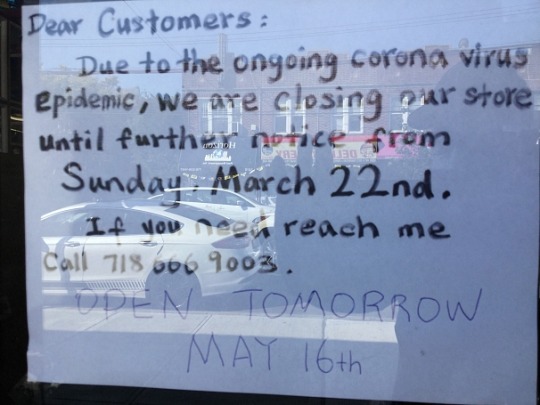
The whole Trump clan was disdainful of the sacrifices hundreds of millions of Americans were making.
Why has the U.S. COVID-19 response been so bad? Jared Kushner, Vanity Fair suggests.
At Times Square Jared and Ivanka's contemptuousness was made into an ad before Election Day.

If you are looking for the Original Sin of Trump's pandemic response, it was on January 22nd when he basically told CNBC's Joe Kernen that COVID-19 was nothing to worry about.

Of course it wasn't "just fine".
Trump did not declare a state of emergency for seven weeks. That gave the virus plenty of time for it to spread throughout the US.
Republicans know that their Dear Leader totally mishandled the pandemic response. That's why they repeatedly try to make Dr. Fauci a type of scapegoat for Trump's horrendous incompetence. Dr. Fauci has spent his entire career fighting disease. Donald Trump has spent his entire career narcissistically promoting himself.
Harry Truman had a sign on his desk saying: "The Buck Stops Here!" If Trump had a sign on his Oval Office desk (which he seldom used except for photo ops) it would be: "It's Everybody's Fault But Mine!"
Don't be hesitant to remind people of how awful 2020 was. And point the finger of blame at the orange blob who was responsible for the catastrophe.
#anthony fauci#covid-19#coronavirus#pandemic#infectious disease#us house of representatives#maga#republicans#marjorie taylor greene#conspiracy theories#donald trump#trump's botched pandemic response#jared kushner#the 2020 recession#lawrence o’donnell#raul ruiz#election 2024#vote blue no matter who
44 notes
·
View notes
Text
Malaria, Sickle-Cell, and Dragons in the Temeraire Universe
so I've been thinking about sickle cell all day because of the very cool real-life FDA crispr treatment approval news, and also I'm just about done rereading empire of ivory so thusly it is time to write the sickle cell/malaria/dragons/benefits of human-dragon mutualism breakdown I mentioned ages ago.
Standard disclaimer that I am not in fact anywhere near an expert on this, this is mostly recall from ANTH 102/215 classes I took five years ago, the info is very simplified and possibly somewhat out of date. I'm doing some quick checks and I write this but only enough to make this an appropriate fantasy novel fandom post, not enough to make it actually reliably informative. I do have a couple citations, but mostly for the parts I'm lifting straight out of a class assignment I wrote, and they're a short documentary hosted on YouTube and the textbook for the class. also none of my links are live because I want this fandom post to actually show up in the fandom tag lol.
second disclaimer is I'm starting at the basic obvious stuff because I genuinely have no idea how much most people know about this and better safe than confusing.
Intro and Background
So the first thing to know about any of this is that human genetics for the most part to not operate on mendelian inheritance. So the punnet squares in high school biology that did human hair or eye color as basic dominant/recessive one-gene traits were totally lying to you. Like they're a teaching tool for a very simple model that works well enough but they're not accurate. Most human phenotypes are way way more complicated genetically than that.
That said, there are exceptions. Mendelian traits (Characteristics that are influenced by alles at only one genetic locus) do exist in humans, a number of them being related to genetic diseases. The list in the ANTH 102 notes I just dug up was: Wet (dominant) or dry Earwax; Albinism; Brachydactyly (dominant); Blood type (ABO, not the positive/negative part); Hereditary breast-ovarian cancer syndrome (BRCA-1, BRCA-2, unknown genes); Huntington’s disease; Lactase persistence (dominant); and Sickle-cell disease (recessive).
So the sickle cell punnet square looks like this for two parents who both have one copy of the sickle cell gene:

Sickle cell is a very painful and life threatening disease, (That's why the FDA approving a crispr treatment for it allowing patients to be their own bone marrow donors is very exciting.) and from an evolutionary perspective, one that very often prevents people from reproducing. It's also not strictly dominant/recessive, in that people heterozygous for sickle cell can have some symptoms like the possibility a sickle-cell crisis triggered in low-oxygen situations (high altitudes, intense exercise, etc).
So one might think that Sickle cell would be a vanishingly rare disease, since having it can be deadly and even having the trait can in some cases cause problems. Only it's not rare by genetically inherited disease standards, not at all.
And to make a long story very short, the reason is malaria.
Malaria
People who are heterozygous (possessing one sickle cell gene and one normal gene) for sickle cell anemia are resistant to malaria. In areas of the world without a high incidence of malaria historically, there is a strong selection against the sickle cell gene, (Biointeractive Malaria and Sickle Cell Anemia, 9:33) but in areas with malaria, both having sickle cell disease (homozygous HbSS) and not having the trait at all (homozygous HbAA) are selected against. People with sickle cell were historically less likely to reproduce, and people who were not resistant to malaria were more likely to die of malaria and also not reproduce. Because being heterozygous with sickle cell is selected for, the gene persists in the population.
The implications of that are best summed up from this map that I just stole from Britannica.com:

I dunno if the percentages on that second one are accurate tbh, other infographic maps I'm looking at give different ranges. but sill, you get the gist about how common it is in equatorial Africa. In the modern United States Black children are much much more likely to be born with sickle cell than white children—the genes don't just go away when the threat of malaria is removed. (And yeah, that's a historical consequence of the slave trade.)
There's some other stuff wrapped up in here too about bio-cultural evolution: There's indications that malaria was not a “significant problem until humans abandoned food foraging for farming” (Haviland, W. A., Prins, H. E., Walrath, D., & McBride, B.). Humans cleared away the forest, which had kept the soil absorbent. Without the vegetation, more water built up on the surface, forming stagnant puddles which were a perfect environment for malaria-causing mosquitoes to thrive, thus creating the conditions for sickle cell anemia to be advantageous. Farming creates caloric surplus which is great for humans, but it also changes the environment in ways that can be detrimental. Malaria is one way, creating the conditions for other epidemic diseases to thrive is another, etc. etc.
But if you've read this far you're probably going "Chi, you promised this would be a fandom post but so far this has been a serious and kind of sad post about disease. when are you going to get to the dragons?"
The Dragons
So the first time malaria comes up in the Temeraire books is in Throne of Jade, when a bunch of the sailors on the Allegiance come down with "malarial Fevers."
Jane, I must ask you to forgive the long gap in this Letter, and the few hasty Words that are all by which I can amend the same now. I have not had Leisure to take up my pen these three weeks—since we passed out of Banka Strait we have been much afflicted by malarial Fevers. I have escaped sickness myself, and most of my men, for which Keynes opines we must be grateful to Temeraire, believing that the heat of his body in some wise dispels the Miasmas which cause the ague, and our close association thus affords some protection. But we have been spared only to increase of Labor: Captain Riley has been confined to his bed since almost the very first, and Lord Purbeck falling ill, I have stood watch in turn with the ship’s third and fourth lieutenants, Franks and Beckett. Both are willing young men, and Franks does his best, but is by no means yet prepared for the Duty of overseeing so vast a Ship as the Allegiance, nor to maintain discipline among her Crew—stammers, I am sorry to say, which explains his seeming Rudeness at table, which I had earlier remarked upon.
I do not know enough about what people thought about malaria in the 19th century to be 100% sure that this is actually malaria, but I think Novik wouldn't want to confuse her readers by calling something malarial that isn't you know..malaria. So I'm going to assume thats what it is. Google is not giving me figures on malaria survival rates before modern medicines for it which is driving me kind of nuts and means I can't say how lucky Riley and Purbeck were to survive with apparently no complications, but that's not the point here anyway. The point is the comment about the aviators not getting sick.
And not only (mostly) not getting sick, but not getting sick even though they aren't actually always near Temeraire. Laurence for example has been working watch shifts near constantly because he's the only one left on the ship who knows what he's doing. That means probably less read & cuddle time than is normal for him and Temeraire, and yet—no malaria.
We modern readers (and Novik) know that malaria is not caused by "miasmas" but by parasites carried by mosquitos. And lo and behold when we get to Empire of Ivory we get:
Mosquitoes sang happily as dusk drew on, though they did not come very close to Temeraire; the flies were less judicious. The shapes of the trees were growing vague when Temeraire woke with a start and said, “Laurence, there is someone coming, there,” and the grass rustled on the opposite bank.
So yeah, the dragons are keeping the mosquitos away. I know fuck all about why—it's probably not heat since you know, mosquitos like warm blooded organisms, but maybe it's an oil or a chemical or some artifact of the way some of them can breathe fire that's present in all dragons or something, they're described as smelling weird a few times, so who knows. If it's a substance like an oil in their skin that could explain why the aviators don't get sick even when they're not nearby, since they could have some on them from contact, but that's just speculation. The point is not the mechanism, just that it's happening.
The Point
This whole post grew out of a throwaway comment I made about the benefits of mutualistic symbiosis with dragons from the human perspective in that one post about how the series has some interesting stuff obviously going on psychologically/biologically. The point of going in-depth on malaria and sickle cell is to show how this is really impressively solid worldbuilding in relation to the Tswana.
See, Empire of Ivory describes locations that seem like they're in modern day Botswana, Zimbabwe, and Zambia, regions which will have had long-term problems with malaria-causing mosquitos. That's not the densest area for sickle cell, but still definitely in the region where malaria would have exerted selective pressure.
Selective pressure which, in a universe where just being around a dragon is going to drastically reduce malaria rates, is going to leave dragon-friendly populations a lot healthier than dragon-unfriendly ones. A community that has a dragon stay every night and work alongside humans during the day is going to have a lot less malaria even without the sickle cell resistance than a community which has no dragon. And considering that malaria is bad enough that sickle cell genes persist despite it also having a high chance to cause a deadly disease, whereas a dragon that's a fully prosocial member of the community is not going to cause more death and instead will probably help with defense and create more caloric surplus (at the cost of consuming most of that surplus) a dragon is just obviously the better option. From there, it's extremely easy to see how the Tswana in the series could develop such a dragon-centric culture and have it be so wildly successful. The dragons provide fertilizer, the dragons allow for fully domesticated elephants, and the dragons render malaria—one of the deadliest diseases in history—nearly a nonissue. Of course they're family.
Citations:
Biointeractive. (2014, August 26). Malaria and Sickle Cell Anemia - HHMI BioInteractive Video. Retrieved October 3, 2018, from https://www.youtube.com/watch?v=Zsbhvl2nVNE
Haviland, W. A., Prins, H. E., Walrath, D., & McBride, B. (2017). Anthropology: The Human Challenge (15th ed.). Boston: Cengage Learning.
#Temeraire#it’s more bio-cultural evolution#wikipedia claims that malaria may have killed 50-60 billion people through history but I do not trust that citation AT ALL#regardless its still one of the deadliest killers ever#the kitten rambles#malaria#sickle cell anemia#Artemis if you read this I am sorry for the butchering I made of some anthropology concepts
104 notes
·
View notes
Text
Charles rolled his eyes when he noted the peace and quiet. But then came the serious voice and he knew he was in trouble. He shouldn’t have given a damn, but those days were in the past. He actually cared about this man now. He cared about his opinions, about his thoughts. He hated when he was truly pissed at him though most of the time he was pissed in return, he hated when he was sad and he hated that he seemed to disappoint him at times right now. Their relationship was still so fresh. Their committed relationship anyway, and it was an adjustment.
He wanted to say something but next thing he knew he felt those fingers in his hair which brought his eyes to flutter to a close. He wondered how James even liked it at times since he basically had dreadlocks from lack of combing but he said he loved it anyway and Charles liked the attention even though it was brief. But then he smirked, opening his eyes to look up at him. “ Usually you remark about me not keeping my clothes on and now you want me to be naked. “ Too bad it was because he was sick, but he’d get undressed. Well. He had said light clothing, but any coaxing for him to be wild and naked instead was sound in his book. “ Help me. “ It wasn’t a question, it was a demand as he started working off his shirt with a groan. He threw it on the floor with a thud, moving to stand but then he collapsed quickly back down on the couch when his knees buckled. Maybe he really was sicker than he even realized, huffing a bit in aggravation.
“ Please. “ Now came the question as he cast an almost begging glance to his lover. He didn’t want him to even leave to get the doctor. Surely he’d get better on his own with just James keeping him company. .. but then he might get a bit frustrated at his next answer. “ Haven’t had anything since yesterday. Just too tired to bother. “ At least this time he didn’t hide that and was forthcoming with the information.
Flint didn’t take anything lying down, so why would he just stop arguing with him? Charles wasn’t shocked at all when he told him off, but when he noted his nose was running he seemed surprised. He felt like such trash that he hadn’t even paid attention to it and now he lifted his fingers to see if indeed his nose was runny. He sniffed a bit when he clearly saw his fingers were wet, realizing a moment then maybe he was a bit sicker than he thought.
He just.. didn’t get sick. Rarely ever, and when it did happen he just managed. When he said he’d barely said a thing, Charles smirked a bit confidently. “ Sounds like you miss the sound of my voice. “ Then he sneezed again and James noted what a stubborn fuck he was. .. that last sneeze hurt his head a bit too much and he groaned. The first little bit of relenting he’d shown. When he brought him the handkerchief he wiped his fingers and his nose. Huh. This was terribly soft a thing, even for Flint but he wasn’t complaining at the moment. .. but if he expected it back he’d have to pry it from his cold dead hands.
Charles sighed heavily in defeat. “ My fucking head hurts, I can’t breathe through one nostril, it’s fucking hot and my body hurts all over. “ He slowly raised his eyes. “ There. Satisfied? “ But it was hard to stay mad at an obstinate Vane when he sneezed yet again and let an open wince escape. Him showing some pain for once sure as hell meant he felt awful. And he groaned with it, laying more against the back of the couch so it took his weight instead of having to hold his muscular frame upright.
#avastyetwats#Charles has the plague rofl#maybe a tropical illness#he’s not the type to get sick so#plus flint worrying like crazy would be cute and sweet#I’m sorry Captain vane but it seems you have malaria#flint worried he might lose him#from the diary of james mcgraw#i wanna be your slave i wanna be your master
9 notes
·
View notes
Note
Your mutuals in a zombie apocalypse?
Im telling u rn I had to analyze this shi bc I didnt know what it was asking at first😭
@deviantaj (rip) — Went AWOL first day, survives, somehow made it across the world
@e0sphorus — Also went AWOL however did not survive solely bc he didn’t move around a lot and got caught in a herd
@themeridian — Stayed with the group, seems like team morale and emotional support, however dies to a disease because someone* keeps using the medicine
@scopekale — Stayed with the group, and smuggled their own solo supplies in, doesn't share, but also barely uses the group supplies. Survives.
@battygutz — Joined the group midway, gunslinger, almost gets killed like 17 times, but somehow, somehow survives by dumb luck.
@mhmmaybe — Lowkey the type to stay in one spot and give handouts to passing survivors, prolly owns a farm or sumthin. Doesn't have lots of trouble with zombies, survives alone
@justaclownwholikesducks — low pain tolerance + screams randomly + easy to scare = dies first 4 months I don't make the rules
@vind3miat0r — Does this thing where they leave the group randomly and no one notices but when they come back they come back with LOOT, dies on an expedition and ppl started to notice
@hammerhead-jpg — Idk why but he seems like the type to live within a community with walls and food n stuff. Miiiight survive depends if someone feels like destroying it. Wonder who 👀
@mrsmiagreer — Lowkey always gives a caring feel so they're one of the 2 doctors on this list, makes sure everyone's as healthy as possible, prefers melee...dies to malaria
@gumballrightfoots — Gives off bandit vibes that steals supplies from other survivors, but based off stealth and not brute force, survives
@mokozroach - Feels like one of those survivors where all they really want is food. No shelter, no proper hygiene (since that need turns into a luxury in the event of an apocalypse), they might even try that trick where they dress up in zombie guts and vibe with the herd. When the winter comes? …Maybe they die to the winter eventually, or scurvy, whatever comes first
@starlightreader - In the group without ppl remembering they’re in the group half the time, and it turns into a vind3miat0r situation where they’ll stay behind in some cases to enjoy scenery or search places longer for more loot and it’s a rare case ppl notice. Survives to join a community and leaves the group
@cyc-chilla - *Is the person who takes all the medicine bc he’s dedicated to surviving ts, resorts to quiet weapons to avoid sound, honestly an equal opportunist scavenger and protector with slight Clementine vibes, can’t tell if you survive or not
@boees whered boee go wtf
Boee - The second doctor on the list that doesn’t deal with the killing zombies schtick at all, if you get bit this is the person you want to be amputated by 🙏🏾 Dies to internal bleeding
@annahxredaxted - Leads a cult/community running water, food, and safety. Ik cult makes it sound sketchy but who’s gonna question her💀 You know what happened to Prescott in The Walking Dead Game Season 3? Yeah that happens to her community, dies to a zombie bite
@prince-damien-of-darkness - One of those people who follows a herd, far behind enough that the herd doesn’t notice, and does it so that when the herd reaches people, they wait till the herd leaves and grabs the stuff the people left behind in a hurry. Might go far enough to use zombie guts to disguise as a zombie and join the herd temporarily. IF they do disguise as a zombie they die to a gunshot, if they don’t they survive long enough to leave the country and find a safehouse
This ask and post has been in my drafts for 6 months as I tried finishing this, Nai doesn’t even remember this ask. If you wanna be added bc I lowkey forgot all my moots just ask dont be scared at all🙏🏾
32 notes
·
View notes
Text
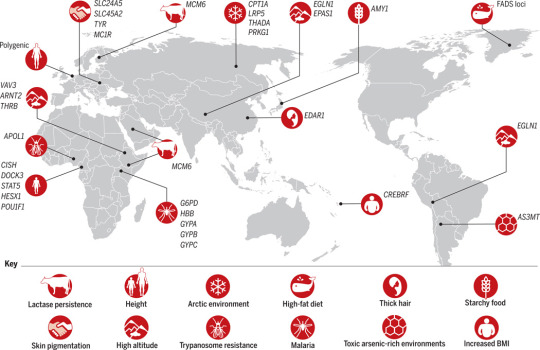
Recent evolutionary adaptations to the environment in human populations, from Going global by adapting local: A review of recent human adaptation (Fan et al., 2016). The icons show the type of adaptation recorded in various parts of the world, and the acronyms besides (e.g. EDAR1) are the names of the involved genes. Also see Genome-wide detection and characterization of positive selection in human populations (Sabeti et al., 2009), Population Genomics of Human Adaptation (Lachance & Tishkoff, 2013).
Some examples are:
Lactase persistence in Europe, Near East, and East Africa, allowing the digestion of milk in adult age (by default, the lactase required to digest milk sugar would only be produced by infants; this was just a matter of removing a timed switch).
Similarly, greater production of amylase, which breaks down starch, is reported in Europe and Japan (diet based on farmed grains) and among the Hadza of Tanzania (diet based on starchy tubers).
Improved conversion of saturated into unsaturated fatty acids in the Arctic Inuit peoples. This makes it easier to live on a diet of fish and marine mammals in an environment where plant food is scarce.
Smaller stature ("defined as an average height of <150 cm in adult males") in the "pygmy" peoples (Aka and Mbuti) of Central Africa, and other hunter-gatherer peoples in equatorial Asia and South America. This helps shed heat in a hot humid climate where sweat does not evaporate.
More efficient fat synthesis in the Samoa, helping with energy storage at the price of more risk of obesity or diabetes with a richer modern diet.
Improved resistence to malaria, sleeping sickness (trypanosome), and Lassa fever in Subsaharan Africa. Fighting off against parasites is especially difficult (since unlike the inorganic environment, parasites also evolve), so this resistence often comes at a cost, such as anhemia, but is still a great advantage on net. Some improved resistence to arsenic poisoning is noted in an Argentinian population.
Denser red blood cells on the Andean, Ethiopian, and Tibetan highlands, to carry more oxygen which is scarcer at high altitude. I recall from elsewhere that this might increase the risk of thrombosis or strokes due to obstructed blood vessels.
Less melanin (which blocks UV light) and therefore lighter skin color in Eurasia. Melanin shields skin cells from damage due to UV radiations, but some UV light is necessary for the synthesis of vitamin D.
A change in the gene EDAR1, resulting in denser head hair, slightly different tooth shape, and fewer sweat glands (all skin annexes), appears strongly selected for in East Asia, but as far as I can find the advantage of this mutation is still unknown.
From another article (Ilardo et al., 2018): the Sama Bajau people of Indonesia, who have a long tradition of free-diving in apnea, seem to have developed larger spleen to store more oxygenated blood during dives.
31 notes
·
View notes
Text
Hi readers of Unspooled Thread! Not sure how many of you this will reach but here's an update!
@velvetcovered-brick had been amazing basically as our PR person, answering comments, making posts, etc. Cause literally they're a saint.
But I wanted to also give an update on writing the latest chapter.
First, I am SO SORRY it's late. You know how a story won't update for a hot sec and then the author posts and is like "I'm so sorry, my cat died, a zombie apocalypse took place, and also I suffered a bout of malaria?"
Yeah, that's basically what happened. Quite literally, first, there were so family problems that happened, as soon as those cleared up my spouse and I left on a family trip for his nonno's 90th birthday. We were traveling too much so I didn't bring my laptop and I'm not as good as typing on my phone as I used to be. THEN I literally got sick the day we travelled back and have been recovering. I still can't fully hear out of my right ear. Woot.
There were various other things, but those are the main points. Meaning writing this chapter took WAY longer than usual.
However, I HAVE GOOD NEWS. I'm at the end of the chapter, writing the very famous Featherington Ball at the end of s2 and all that transpires. Some events shall change slightly, some dramatically, and some... well, you'll have to read to find out. ;)
I should be done today or tomorrow, but then we have to do edits. But I promise this means it's coming soon.
Now, I feel like there will be some questions when this chapter comes out, specifically with our beautiful Penedict and the progress of their relationship. Since it's a canon rewrite, @velvetcovered-brick and I very seriously look at each season and where characters are, and how they change and develop differently based on the new situations we have put them in.
You'll notice Benedict matured faster than in the show timeline. What I mean by "mature" is that he became ready for love much more quickly than in the show. In s1-3, Benedict is not ready to settle down. We believe he cares deeply about his sexual partners but that is not the same as enduring love. To fast-track him to that point but in a believable manner, we hypothesized that making him take on the responsibility of caring for another person, another woman, besides his sisters closely and deeply would help with this.
For Penelope, being so much younger, this was different. Even if she fell in love with Benedict earlier, we did not believe she would or should act any earlier than s3. We based this heavily on Nicola's observation that in s1, Penelope is a girl. In s2, to quote the great Britney Spears, she's "not a girl, not yet a woman."
But s3, Penelope? She's a woman and ready to own it.
Sooooo, yeah. There's my ramble. As a treat, here's an unexplained, excerpt of dialogue from the latest chapter we are finishing up:
“Is there something even more binding than a swear, Ben?” “A blood oath, perhaps? A tithing?” “Very well, then. As your new patron saint–” “Hold on! Are you not getting a fullhead, Lady Whistledown?”
#bridgerton fanfiction#bridgerton#benelope#benedict bridgerton#unspooled thread#penedict#penelope featherington
19 notes
·
View notes
Text
Fever
I see a lot of misconceptions about fever floating around the web, so I'm gonna try and set some things straight. We're gonna talk about what fever is, how it is caused, and types of fever. Then I'll give some writing tips. Just a note, with a lot of things, there are exceptions and special cases. I'm going to go over the most common stuff cause this isn't an immunology course.
What is a fever? The normal body temp (the average of a bunch of people) is 98.2°F. Individuals can differ from this within a degree. A fever is usually a temperature greater than 100°F. There's some leeway to this, and it takes a lot of experience to get a feel for what should be a normal temperature. But if someone comes into the office with a 100°F temp, I'm going to say that they have a fever.
So with fever (ignoring the symptoms of whatever caused it), you're generally going to have malaise, chills, paleness, and rigors (muscle contractions). There may also be behavioral symptoms such as seeking warmer environments, altered mental status, and assuming a fetal position to help warm the body. The peripheral vessels will constrict in order to keep blood in the central body. Once the fever has passed, there will be chills and sweating.
What causes fever? Fever is caused by pyrogens. These can be endogenous (from you) or exogenous (from something else). The main endogenous ones are interlueukin-1, interferon gamma, and tumor necrosis factor α. These are made by immune cells and a few other cell types. Exogenous pyrogens are made by other microorganisms. An example of this is lipopolysaccharide, which is made by gram-negative bacteria. Exogenous pyrogens induce the production of endogenous pyrogens, which induce the production of Prostaglandin E2. PGE2 acts on the hypothalamus to set the body's thermostat higher. This induces the effects seen in order to raise the body's temperature. Fever helps to stimulate the immune system and inhibits microorganism growth (too hot for them). So it's a good thing, unless it gets too high and your organs shut down and your brain melts like butter (i'm kidding...but really, it's bad). I'd say over 110°F and you're probably going to die.
What are the patterns of fever? There are three fever patterns, and they are associated with different pathologies. They are sustained, intermittent, and remittent fever. Sustained fevers are exactly what they sound like. They don't fluctuate more than a degree in a day and never touch normal baseline temp. These are typically seen with pneumonia, typhoid, bacterial meningitis, and UTI.
Intermittent fever is a fever that is only present for a few times throughout the day, with the temp going up above normal and back down to normal. This is seen with malaria, septicemia (a serious bacterial infection -> think septic shock), pyogenic infections (bacteria that cause pus formation), and TB.
Remittent fever fluctuates more than two degrees throughout the day, but does not ever touch normal baseline temps. These are seen with infectious diseases.
These patterns are okayish, but sometimes people don't always have a disease that matches the fever type. I think typhoid, TB, and tick-borne diseases (they cause a relapsing fever) are the best diseases to use fever patterns for.
Writing Tips
Okay, so first off I think fever is great for writing. So to find out what's going to happen, you need to pick out what the nature of the illness is. The most common one I see is infection from a wound of some kind. So this is going to be bacterial. I would say that you are most likely to have an infection with staph, strep, or pseudomonas. These are naturally found on the body, but are not meant to be inside you. A cut in your skin lets them in. This is bad. So your immune system will notice them and release pyrogens, and then you get PGE2, and then you get fever.
I would probably say you'd get the standard symptoms above, plus pain, swelling, and redness at the site of the infection. It's going to be an intermittent fever probably (could end up as remittent). So you would want to treat the infection itself. If there are no antibiotics or antipyretics (anti fever drugs), then you would have to clean and disinfect the wound, and basically hope that the immune system can do its thing. You can wipe the person down or use a cool compress on them, but this doesn't really reduce fever that much and is more of just a temporary relief.
Anyways, I hope this was helpful and as always, sources are in the comments. You can let me know if you have a specific situation you would want some info on in the comments/askbox/DM.
#medicine#med student#medical school#whump community#whump#whump reference#med school#med studyblr#biology#whump writing#medical writing#writing reference#writing help#fever#immune system#immunology
18 notes
·
View notes
Note
i LOVED those chuckler headcanons - he's my absolute fave in the pacific and there's so little writing about him! could i request some more, maybe chuckler with a medic reader during wartime?
Chuckler Dating a Medic
Chuckler Juergens x Medic!Reader
Masterlist
A/N: Hi anon! Thanks for the request!! Love this gif (peep my baby hoosier 🫶) this is about the fictional portrayal of the H company boys on the show. nothing but love and respect for veterans on this blog!

Being assigned to H company, you meet the boys on the ship over.
The first time Lew sees you, he has to do a complete double-take.
At first he's like, "That's a woman," and then he takes a good look at you..." Wow. that's the most beautiful woman I've ever seen," type vibes.
He immediately gets a crush on you, and by the time y'all deploy to Guadalcanal, the poor fella is hopelessly in love, despite not knowing you for long.
Bill and Leckie's teasing is unending, and it's the only time you see Lew clam up and get embarrassed.
When the company first encounters the Japs at Tenaru, Lew's heart is in his throat every time he sees you dart from foxhole to foxhole, responding to the call for a corpsman.
He tried to keep tabs on you, but amongst the smoke and bullets in the air, he lost you. Even though he wanted to go searching for you, Lew knew you were good at your job and that he had his own to do, but it didn't stop him from worrying.
When morning came and the dust settled, he saw you sitting in a hole, staring off into space, your dungarees covered in blood (it's not yours). He freaks out and slides next to you, asking you a million questions.
Lew cups your cheeks gently to get you to look at him, and instinctually, you lean forward and connect your lips. It was s short kiss (really like a peck), but it shut Chuckler up, and he stared at you dumbfounded.
"You just kissed me," he says, his eyes wide.
You smile, your teeth a contrast to the dirt and blood on your face. "I did."
Then...boom, he asks you to be his girlfriend, and you ofc say yes. You've gotta keep it on the DL, but the boys know and joke about it constantly, but you also know they would take the secret to the grave if they had to.
Any time Lew would get even the slightest bit hurt, and I mean like a tiny cut on his finger or something, you'd go in full medic mode.
"I need to disinfect it," and "Let me see, hon."
Deep down, you're absolutely terrified of losing him, so you kind of go crazy making sure you do everything in your power to keep him healthy.
You're probably the mom friend of the group and always make sure they're all doing okay. In turn, Chuckler is always there for you if you want to talk about anything.
Being a medic is draining, and there are some days that you just lay in his arms at night, trying to forget the blood and death you'd witnessed that day.
By the time you got to Melbourne, you were almost to your breaking point. Seeing boys blown to bits and crying for their mothers day after day became too much.
Instead of going out and exploring, you stayed in the stadium and slept like Hoosier. You told Chuckler to go have fun, but he insisted on staying with you. He sat propped against the legs of your cot, rubbing your hand gently, trying to coax you to sleep.
As the months went on in the Australian city, everything seemed to get better, and you took advantage of the time you had with Lew.
You went to the beach, learned how to play cricket, and went on a million picnic dates.
When your orders came that you were going to ship out again, Lew went out, bought a ring, and proposed.
You say yes, and he puts the ring on a chain for you to wear.
On Cape Gloucester, you were often caught up in the medic tent treating infections and other illnesses like the enuresis that Bob ended up developing.
Pavuvu was even worse when it came to sickness. Runner was badly sick with malaria, and you and Lew were tending to him the best you could, but there wasn't much you could do.
You'd stay up all night beside his bedside, keeping tabs on his fever and making sure he didn't need anything. After a few days of this, you were dead on your feet, and Chuckler had to step in.
He'd gently urge you to bed and sit beside your cot, running his hand through your hair. Within seconds, soft snores escaped your mouth and you were out like a light.
From Pavuvu, you went to Peleliu, and nothing could ever prepare you for what you saw there. It was the bloodiest, most horrifying thing you'd witnessed so far. By the time the Marines took the airfield, Leckie, Bill, and Runner had been hit, and you had no idea where Lew was.
When you found him, you almost cried, and he engulfed you in a HUGE hug, lifting you off your feet for a moment.
The pair of you stick side by side through the campaign on Peleliu until he gets hit, and when he does, you patch him up as you try not to fall apart.
Finally, you're called back off the line, and you're by Lew's side the whole time as he's carried on the stretcher to the medical ship. You couldn't go with him, no matter how much you wanted to, so you said a tearful goodbye and kissed him softly, promising you'd see him soon.
You wrote him as you made your way through Okinawa, and you burst into tears when the news of the war's end reached you.
Lew was waiting for you when you finally got to come home. The first thing y'all do is go to the courthouse and get married!
The two of you spend the rest of your lives living outside Chicago in a small town that was quiet and peaceful, except for the trouble your kids caused when became teenagers!

Tag List: @liptonsbabe @footprintsinthesxnd @bucky32557038ww2 @flowers-and-fichte @merriell-allesandro-shelton
message or comment if you want to be added to the tag!
#hbo war#the pacific#lew juergens#chuckler headcannons#chuckler juergens headcannons#chuckler imagines#chuckler x reader#chuckler juergens#lew chuckler juergens#lew juergens x reader#lew juergens imagine#lew juergens headcannons#the pacific headcannons#the pacific x reader#the pacific imagine#the pacific imagines#hbo war imagine#hbo war fanfic#hbo war headcannons#hbo war x reader
76 notes
·
View notes